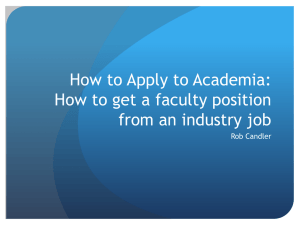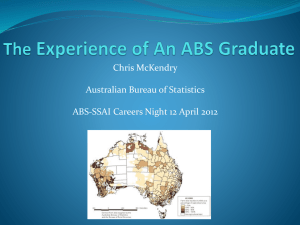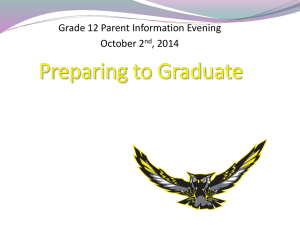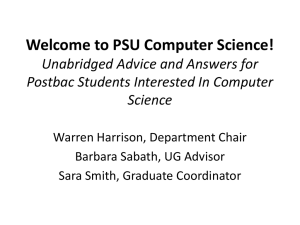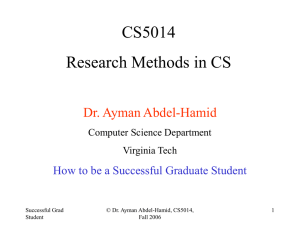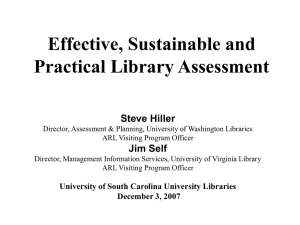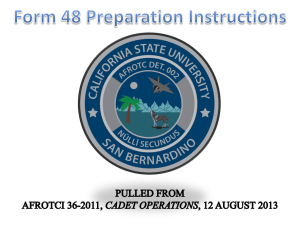Balancing Graduate School and Personal Life
advertisement
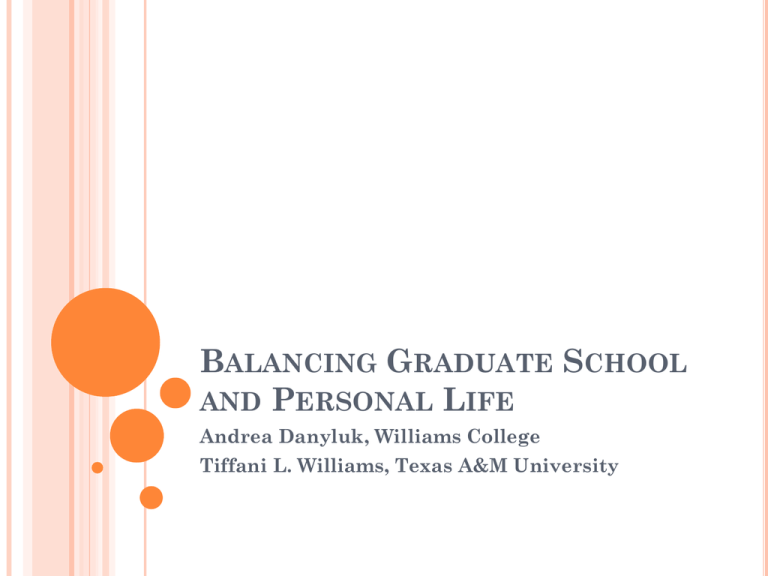
BALANCING GRADUATE SCHOOL AND PERSONAL LIFE Andrea Danyluk, Williams College Tiffani L. Williams, Texas A&M University ABOUT ANDREA Education B.A. Math/CS,Vassar College (1984) Ph.D. in CS, Columbia University (1992) Machine Learning Jobs (post Ph.D.) Researcher in Expert Systems Lab, NYNEX Science and Technology (1990-94) Assist, Assoc, Full Prof, Dept Chair 3 years, Acting Dean of Faculty 1 year, Williams College (1994-present) Service CRA-W, LACS, CS 2013, program committees, ICML co-chair 2001, ICML general chair 2009 Family Married Andrew 1984 Stephan 18 years old,Katya 16 Fun Biking, hiking, skiing, Kids’ activities, Time with friends, Travel ABOUT TIFFANI QUESTION #1: WHAT DOES GRADUATE SCHOOL AND PERSONAL LIFE BALANCE MEAN TO YOU? QUESTION #2: BASED ON YOUR PERSONAL DEFINITION, HOW MANY OF YOU ARE CURRENTLY LIVING A BALANCED LIFE? QUESTION #3: WHY IS WORK-LIFE BALANCE IMPORTANT ENOUGH TO GET US OUT OF BED FOR AN 8:30 A.M. SESSION! TIFFANI’S DEFINITION I am physically, mentally, and spiritually sound. Physical: I exercise at least 3 times a week. Mental: I get a lot of mental exercise being a professor. Spiritual: I read a lot of cool stuff from all over the world (e.g.,Bhagavad Gita, I Ching, Bible, poetry) I am able to happily teach others. Not always easy—especially when dogs are still eating students’ homework. I am grateful for life’s experiences. Not always easy—especially when stressful situations occur. ANDREA’S DEFINITION Knowing I’m giving time to the people in my life (especially my kids) and to my work. Not necessarily equal amounts of time. Not necessarily the “perfect” split every day, but over time. Making a difference in my students’ lives Making Computer Science a happier place for everyone Feeling healthy and energetic. Being able to focus. I hate feeling like I’m thrashing! Being able to laugh. Appreciating every day, whether good or bad. EVERYONE’S DEFINITION OF WORK-LIFE BALANCE IS DIFFERENT Your definition must be unique to you and your situation. Without a definition or some type of guidance, how will you know you are out-of-balance? Being out of balance causes even more stress, etc. HOW DO WE GET OUT-OF BALANCE? Academic stresses Personal stresses ANDREA’S GRAD SCHOOL EXPERIENCE (OUT-OF-BALANCE) Three advisors in as many years, with the third really not working out. Fell behind on completing my “area requirement.” Would the faculty respect me if I changed again? Would anyone take me on as an advisee? Dieting “successfully” and happily, but not so smartly. Grapefruit and coffee aren’t the basis of a good diet. Feeling crummy. Eating right helps one think straight! ANDREA’S GRAD SCHOOL EXPERIENCE (IN-BALANCE) Confided in a grad school friend about my advisor dilemma. She talked to her advisor, who talked to another faculty member, who was happy to take me on as an advisee. Kept up with exercise; returned to a healthier diet. Completed area requirement and proposal in record time. Spent remaining time at Columbia very happy in my new research group. TIFFANI’S GRAD SCHOOL EXPERIENCE (OUT-OF-BALANCE) My graduate advisor did not receive tenure. So, the last year or so of my Ph.D. journey was difficult. Although a difficult situation, it made no sense to change advisors—even though she was no longer at the university. Had no faculty member to discuss my research or essentially review my thesis. As a result of health issues, my mom was struggling to live on her own. How could I take care of her as a grad student? TIFFANI’S GRAD SCHOOL EXPERIENCE (IN-BALANCE) I had a strong support system to help me realize that even without my advisor there full-time, I was more than capable of completing the Ph.D. I worked on my Ph.D thesis everyday. It actually got to the point where I was having fun thinking about my research topic and its possibilities. It also helped that I got a new laptop. In 2000, having a new laptop was a big deal—well at least to me. My mom was able to stay with me for a week during graduation. Her health didn’t seem to both her as much at that time. After graduating, I was in a much better position to get her the care that she needed. HOW WE GET OUT-OF BALANCE: GENERAL ACADEMIC STRESSES The nature of grad school itself Open-ended What it means to complete a milestone more vague once course requirements complete No obvious finishing date We’re “high achievers” We tend to be goal-oriented perfectionists There’s always more to do Can feel as if it’s a competition for “who works the hardest” We all have insecurities We can’t manage an insane pace forever Burnout, poor productivity Demands come from many directions HOW WE GET OUT-OF BALANCE: SOME SPECIFIC ACADEMIC STRESSES Courses Want to learn the material and to do well Need to learn that sometimes doing “well enough” is ok Research Might be a new experience Requires a new level of independence and confidence (paper submissions, rejections….) Need to push through the times when you’re just stuck Requires dealing with group dynamics Requires learning from but also “managing” your advisor Service It’s fun (and easy!) to get involved in departmental and other service Extra demands placed on women Work as a TA, RA, etc. HOW WE GET OUT-OF BALANCE: PERSONAL STRESSES Many people in our lives (partners, parents, friends, children) A source of happiness, but Their stresses can be our stresses For many, a time for finding a partner, starting a family Managing finances on a grad student stipend Logistics of caring for a home (even a small shared apartment), a car, etc. Health issues ACHIEVING BALANCE: GOALS AND EXPECTATIONS Know your own goals Understand others’ expectations Prioritize them Post them where you can see them, if needed Know which expectations are self-inflicted! Understand what’s required to achieve a goal Know why you want to achieve it Be sure (to the extent possible) that it’s achievable Know how to evaluate your progress Talk to your mentors and others Learn to enjoy the process Focus on the present Appreciate your achievements before moving on QUESTION #4: WHAT ARE YOUR GOALS? ACHIEVING BALANCE: TIME MANAGEMENT Get organized Break your day into manageable segments Be realistic about the timing of tasks Allow time for interruptions and distractions Reward yourself for sticking to it! Know when it’s time to stop To-do lists: short, medium, and long term Keep a calendar Set aside time each day to review your schedule For many tasks, 1-hr increments work well Keep the perfectionist in you under control Avoid distractions Make a list of your bad habits Set aside quiet time; pick a time to work when others aren’t there Set aside time for email – or, if you’re like me, find a space where it’s hard to get to your email If a stray thought pops into your head, write it down. Save it for later. Set up a comfortable work space A cluttered desk can mean a cluttered head Don’t underestimate the beauty of a good chair, a great pen, a cup of coffee…. ACHIEVING BALANCE: INSECURITIES Seek out a support system Mentors Family and friends Realize that we all have insecurities Do your homework to minimize your chances of failing But everyone will fail once in a while. It’s a natural consequence of doing something hard. Learn to enjoy your successes Don’t belittle your own accomplishments Keep a “good file” of positive feedback ACHIEVING BALANCE: CHOOSING ACTIVITIES Saying “yes” to one thing means saying “no” to something else Or at least it means having less time for what you’re already doing Take some time before you decide Does it fit your goals and priorities? Don’t do anything out of guilt Say “yes” or “no” to the task, not the person ACHIEVING BALANCE: MANAGING OTHERS If you plan to say “no” to a request to take on a new responsibility Do it as soon as possible Suggest someone else who might be available and want to do it If you really wish you could do it, say so; ask to be invited again Set boundaries, parameters Explain why you believe it will take longer Communicate about the resources you need What to do about the advisor, student (if you’re a TA), fellow grad student who needs you now “I’d be happy to talk/help you/etc. Can we schedule a time (in 5 min, an hour, next week….) do do that?” ACHIEVING BALANCE: MAKING TIME FOR YOURSELF Schedule time for yourself “Free time” won’t magically appear; you have to make it Share responsibilities with friends Throw money at responsibilities (when you can afford it; can be tough as a grad student!) Streamline Don’t apologize for the fact that you have a life outside of grad school! QUESTIONS? EXAMPLE REWARDS Andrea Running Hiking/Cycling Traveling Tiffani Working out with a personal trainer Reading Buying the latest gadget—if it’s in the budget Doing nothing!
